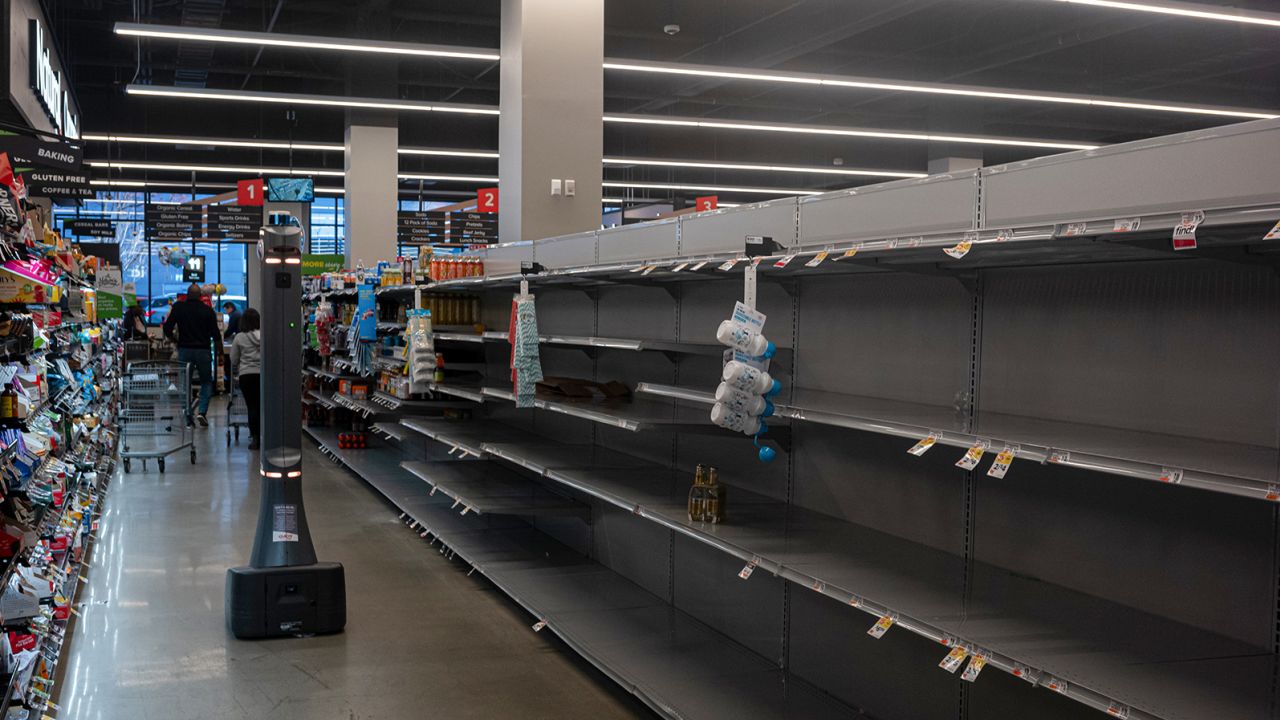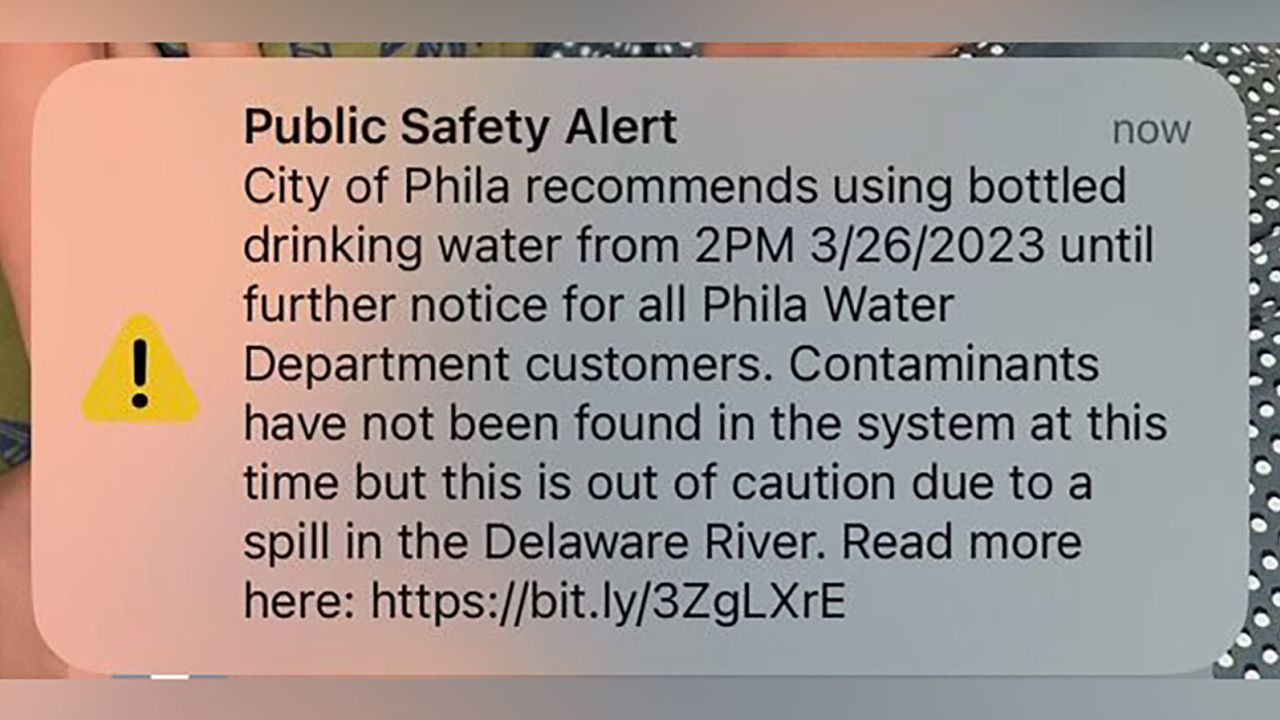CNN —
Philadelphia officials are expected to provide an update on the city’s water quality Tuesday morning following a chemical spill upstream in the Delaware River that has left many residents concerned and scrambling to buy bottled water despite the city’s assurances that their tap water is currently safe to drink.
City officials have said the water supply is safe to drink and use until at least 3:30 p.m. Tuesday. About 40 water quality tests conducted as of Monday afternoon showed no indication of contamination, Michael Carroll, the city’s deputy managing director for transportation, infrastructure and sustainability, said.
The Philadelphia Water Department expects there will no longer be contamination in the river by Wednesday or Thursday.
Still, many residents have rushed to snag bottled water from quickly-emptying grocery store shelves, saying they are still concerned about potential hazards. Many have also expressed frustration and confusion over officials’ repeated statements that the city’s water if safe, even after they initially asked residents to drink bottled water as a precaution.
“Right now, I feel like it’s like a race. First come, first serve,” resident Karina Medina told CNN affiliate KYW-TV. “It’s sad because everybody needs the water, and right now, I’m on my mission for water.”
Resident Gerald Brown told CNN he’s still buying water from the store as a precaution, saying, “You just can’t take any chances nowadays. You just gotta take care of your family. You gotta be sure.”
An estimated 8,100 gallons of the chemical solution was released into the Delaware River late Friday night just a few miles upstream of a key water intake for Philadelphia’s Baxter Water Treatment Plant. The spill was the result of an “equipment failure” at a Trinseo PLC plant that makes acrylic resins, the owner said.

At least one of the leaked chemicals, butyl acrylate, is among the contaminants of concern identified in last month’s derailment of a train carrying hazardous materials in East Palestine, Ohio.
Philadelphia resident Joe Sole told CNN that the experience of East Palestine residents – some of whom have reported feeling new health complications after the spill – has made him more wary of relying on officials’ statements.
“We’re afraid to drink the regular water,” Sole said. “I don’t trust the city.”
Carroll acknowledged concerns about the discharged chemicals but said they have yet to be detected in the city’s water. He added that the “potential for contamination is diminishing over time.”
“Butyl acrylate, in particular, is a chemical that was identified in the spill in East Palestine. So, we understand there are some known health effects and their established thresholds in terms of the parts per billion that the EPA feels are safe,” Carroll said Sunday.
On Monday, officials reiterated advice that residents should have three days of water on hand as a precautionary measure in case contaminants are discovered in the city’s supply. Mayor Jim Kenney recommended filling bottles and pitchers with tap water.
Not all Philidelphia residents receive water from the Baxter plant. The city’s two other treatment facilities are fed by the Schuylkill River, which the city says was not impacted by the spill.
Some residents have expressed confusion after city officials sent an initial mobile phone alert recommending that people use bottled water beginning at 2 p.m. Sunday, only to say later that afternoon that water from the Baxter plant was safe to use until at least Monday night.
The first advisory was sent “out of an abundance of caution,” officials said after updating the guidance Sunday. But some residents felt that the quickly-changing information eroded their confidence in Philadelphia officials’ handling of the incident.

“They sound like they don’t really know what they’re talking about,” Sole, the Philadelphia resident, said. “They don’t sound confident in what they’re telling us.”
Carroll said Monday that communicating about the spill is a “difficult thing to balance.”
“Everything we have done to communicate with the public has been done in the interest of both transparency and out of an abundance of care and caution to make sure our people are safe,” Carroll said.
Kenney said Monday that officials are working “around the clock” to ensure the spill doesn’t become a public health risk.
“We understand the legitimate concern that is felt by the public as the release of chemicals into our waterways can pose a major threat to our health and safety,” the mayor said in a statement.
At least 60,000 gallons of contaminated water has been collected since the spill, the US Coast Guard said Sunday.
The agency did not see any visible signs of the leaked product, which officials have described as a white plume, while conducting patrols along the Delaware River Sunday, the Coast Guard said.
Trinseo says the solution overflowed from the on-site containment system and flowed into a storm drain, where it was carried to Otter Creek and then to the Delaware River.
“Because the material is highly water soluble, and the release coincided with a period of rainfall, the material dissipated quickly in the water,” the company said in a release.
Among the chemicals that spilled:
• Butyl acrylate is a potentially flammable colorless liquid with an acrid odor which can cause irritation of the eyes, skin and respiratory system, according to the US Centers for Disease Control and Prevention’s National Institute for Occupational Safety and Health.
• Ethyl acrylate can cause irritation symptoms depending on exposure, the CDC says. Both are often used in the manufacturing of paints and adhesives.
• Methyl methacrylate, sometimes called MMA, is a colorless liquid with a fruity odor often used in the production of acrylic plastics and resins. Exposure to MMA can cause irritation to the eyes, skin, nose and throat as well as skin inflammation. The polymer version of MMA is often used in dental applications.
The facility, which halted its operations following the spill, plans to partially resume production “within the next several days” before returning to full production soon after, the release said.


